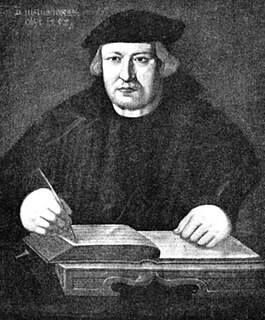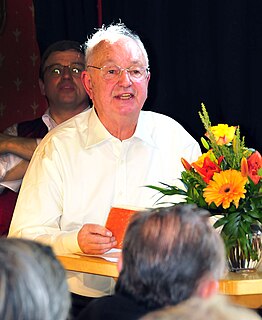The Bach-Werke-Verzeichnis is a catalogue of compositions by Johann Sebastian Bach. It was first published in 1950, edited by Wolfgang Schmieder. The catalogue's second edition appeared in 1990. An abbreviated version of that second edition, known as BWV2a, was published in 1998.

Günter Meisner was a German film and television character actor. He is remembered for his several cinematic portrayals of Adolf Hitler and for his role as Arthur Slugworth in Willy Wonka & the Chocolate Factory. He was fluent in four languages and appeared in many English-language, German-language and French-language films.

Robert Atzorn is a German television actor. He was born in Bad Polzin, Pomerania, Germany, now Połczyn-Zdrój, West Pomeranian Voivodeship, Poland.
Chorale fantasia is a type of large composition based on a chorale melody, both works for organ, and vocal settings, for example the opening movements of Bach's chorale cantatas, with the chorale melody as a cantus firmus.

Maren Kroymann is a German actress and singer.

"Ach Gott, wie manches Herzeleid" is a German hymn in 18 stanzas attributed to Martin Moller (1587). It is often catalogued as a paraphrase of the Latin "Jesu dulcis memoria", a medieval hymn attributed to Bernard of Clairvaux, but only a few lines refer directly to this song. Hymn tunes were composed for the hymn, and it is also often sung to a tune composed for "Herr Jesu Christ, meins Lebens Licht". The anonymous hymn tune of "Herr Jesu Christ, meins Lebens Licht" first appeared in Wolflein Lochamer's Lochamer-Liederbuch, printed in Nürnberg around 1455. In Leipzig in the 1720s, Johann Sebastian Bach composed settings of Lochamer's hymn based on four of his church cantatas and a sacred motet.
Paul Esser was a German stage and television actor and voice actor. He is remembered for playing the lead role in the Sender Freies Berlin version of the detective series Tatort. Esser was born in Geldern-Kapellen and died in Tenerife.
"Wär Gott nicht mit uns diese Zeit" is a Lutheran hymn, with words written by Martin Luther based on the Psalm 124. The hymn in three stanzas of seven lines each was first published in 1524. It was translated to English and has appeared in 20 hymnals. The hymn formed the base of several compositions, including chorale cantatas by Buxtehude and Bach.

"Herr Gott, dich loben wir" is a Lutheran hymn, which Martin Luther wrote in 1529 as a translation and partial paraphrase of the Latin Te Deum. It is sometimes called the German Te Deum. The hymn was first published in 1529. Its hymn tune, Zahn No. 8652, is a simplification of the melody of the traditional Te Deum. It has appeared in 24 hymnals.

Gelobet sei der Herr, mein Gott, BWV 129, is a church cantata by Johann Sebastian Bach. It is a chorale cantata performed on Trinity Sunday 8 June 1727 in Leipzig. Rediscovery of the printed libretto of the cantata in the first decade of the 21st century led to a re-appraisal of prior assumptions regarding the early performance chronology of a few cantatas, including this one.
The 66 Chorale improvisations for organ, Op. 65, were composed by Sigfrid Karg-Elert between 1906 and 1908, and first published in six volumes in 1909. The composition was dedicated to "the great organist Alexandre Guilmant".
Franz-Otto Krüger was a German film and television actor. Krüger already started his acting at Berlin theatres in 1934, but his career was interrupted by his service in the Second World War. He appeared in over 125 film and television productions between 1947 and 1987, mostly in supporting roles. One of his first films was Roberto Rossellini's neorealist classic Germany, Year Zero.

"Wo Gott der Herr nicht bei uns hält" is a Lutheran hymn by Justus Jonas, a paraphrase of Psalm 124 in eight stanzas. It was first published in 1524 in the Erfurt Enchiridion. The theme of the psalm is the need of help against raging enemies. It has been translated also as "Where the Lord God does not stand (stay) with us", "If God the Lord is not with us", "If God the Lord is not on our side", among others.

Herr Gott, dich loben alle wir, BWV 130, is a chorale cantata by Johann Sebastian Bach for the Feast of archangel Michael. The oldest known version of the cantata (BWV 130.1) was performed on that feast day in 1724 during Bach's second year in Leipzig. The cantata is scored for SATB soloists and choir, three trumpets, timpani, traverso, three oboes, strings and continuo.

"Herr Christ, der einig Gotts Sohn" is a Lutheran hymn by Elisabeth Cruciger. Printed in 1524 in the Erfurt Enchiridion, together with 18 hymns by Martin Luther, it is one of the oldest Lutheran hymns. The text combines Lutheran teaching with medieval mysticism. It has been the basis of musical settings such as Bach's chorale cantata Herr Christ, der einge Gottessohn, BWV 96.

Robert Naegele was a German film and television actor.
This is a list of German television related events from 1988.
"Herr Jesu Christ, wahr Mensch und Gott" is a Lutheran hymn by Paul Eber. It is a hymn for the dying. One of the hymn's tunes, Zahn No. 423, is also used for "Wir danken dir, Herr Jesu Christ".









